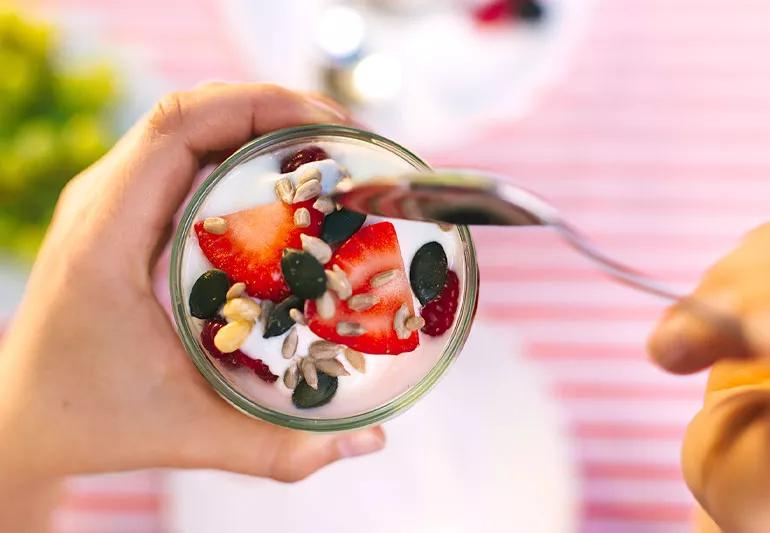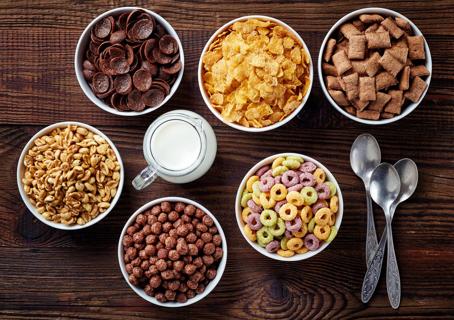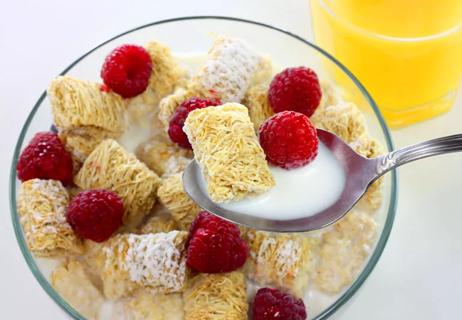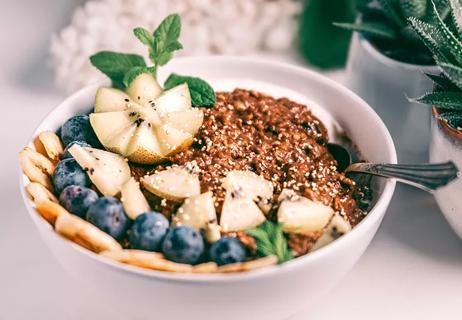Who doesn’t love a good breakfast? Just make sure it’s loving you back

There’s nothing like a hearty breakfast to start your day. Bacon, biscuits, buttery grits — oh my! When it comes to the first meal of the day, the tempting taste sensations are pretty much endless. On the downside, though, a lot of our favorite breakfast go-tos can be loaded with cholesterol.
Advertisement
Cleveland Clinic is a non-profit academic medical center. Advertising on our site helps support our mission. We do not endorse non-Cleveland Clinic products or services. Policy
When you’re brunching it up or grabbing a quick bite before work, what should you reach for? Registered dietitian Kate Patton, MEd, RD, CCSD, LD, shares some good brekkie picks and watch-outs to help keep your cholesterol under control.
When it comes to cholesterol content, Patton says these foods can be the worst breakfast offenders.
“The combination of egg, cheese and bacon/sausage can be a major source of cholesterol. And if they are cooked in butter or served on a croissant, that adds even more cholesterol,” says Patton.
Your morning perk-me-up could be doing more harm than good if it’s dressed up with all the extras. Patton says lattes with whole milk and whipped cream are another source of cholesterol.
You’ve been stocking up on that organic chicken sausage and feeling pretty darn proud about it, too. Good effort, but you still have to watch out for cholesterol. “People often think that turkey bacon, turkey sausage or chicken sausage are better options. However, they only have slightly less cholesterol than pork or beef counterparts,” Patton explains.
You hear “breakfast” and your mind goes to the usual hits — pancakes, cereal, toast, eggs or maybe a smoothie. But you might want to start thinking globally instead of locally when it comes to switching up your a.m. rotation.
Advertisement
“A lot of cultures start their day with beans, olives, tomatoes, cucumbers, extra-virgin olive oil and pita bread. While we might consider these as non-traditional breakfast items, they’re good because they don’t have cholesterol and will provide steady energy throughout your morning,” Patton says.
You might add it to morning smoothies or enjoy yogurt parfaits for breakfast. But yogurt isn’t always an obvious choice for many.
“Yogurt is a common food for breakfast, but some may not consider it. Depending on its fat content, there may be some cholesterol in it but not a lot,” notes Patton. If you go for yogurt in the morning, she suggests choosing one that doesn’t have added sugar. Instead, add fruit to sweeten it with natural sugar, along with additional flavors and textures from oats, nuts, ground flaxseed and chia seeds.
What are some low-cholesterol breakfast staples that we should always keep around the house? Patton recommends the following:
Change doesn’t have to be hard. Here’s some low-cholesterol breakfast inspiration to get you started.
This hearty option is good if you’re looking for an alternative to eggs or even smoothies. You can make it ahead of time and it’s a great source of protein, fiber, omega-3 fats and important minerals. Get the berry breakfast pudding recipe here.
Since Patton mentioned keeping oats around the house, you might as well get creative with them. Overnight oats are a good solution when you need something quick and filling but don’t want to cook. And the flavor combinations are endless. Here are seven overnight oat recipes to try.
As we all know, avocado toast has become a brunch delight over the last few years. But you don’t need to make a reservation to enjoy it. Make this flavorful version of avocado toast at home in minutes. It has no cholesterol and is loaded with phytonutrients and healthy fats.
We know, we know. Those breakfast egg sandwiches can get us into trouble. So here’s a savory alternative in “muffin” form. This combination of egg whites/egg substitute, low-fat cheese and fresh vegetables are simple to make and low in calories and fat. You can enjoy these veggie omelet “muffins” for breakfast with a side of fresh berries or have them for lunch with a nice tossed salad.
Advertisement
Cholesterol is naturally produced by your body, so we should try avoiding it in the foods we eat. Your body uses cholesterol to make bile, a fluid that your liver makes to digest fat in your intestines. Your body also uses cholesterol to make vitamin D and hormones like testosterone and estrogen.
According to the U.S. Food and Drug Administration (FDA), the Daily Value (DV) for cholesterol is less than 300 milligrams (mg) per day. When you’re looking at nutritional labels, keep in mind that 5% DV of cholesterol or less would be considered low. If a food has 20% or more cholesterol per serving, that’s considered high.
In Patton’s words, it’s simple. “Dietary cholesterol only comes from animal sources. So, if it comes from an animal, it has cholesterol.”
Here are some cholesterol culprits:
“A diet high in animal fat, saturated fat and cholesterol is associated with an increased risk of heart disease, stroke, certain cancers, diabetes and obesity. It is important to assess how much animal fat you are consuming and try to replace it with plant-based foods instead,” says Patton.
Advertisement
Learn more about our editorial process.
Advertisement

There are better breakfast options, but if it’s got to be cereal, look for whole grains, high fiber and no added sugar

Whole-grain options low in sugar and sodium form the foundation of a good-for-you breakfast

Move over oatmeal! It’s time to make room at the table for these grain options

Learn the benefits of a morning meal, plus five healthy food ideas to start your day right

There isn’t enough research to recommend the supplement as a solution for lowering LDL levels

You may notice a decrease in your LDL ‘bad’ cholesterol in about four weeks

People with PKU need to avoid high-protein foods, like meat, dairy, legumes and whole grains

The tropical fruit is a good source of antioxidants and vitamin C

Most people fall asleep within 10 to 20 minutes, but if your experience is different, adjusting your sleep schedule may help

Exploring your hidden side can lead to better understanding of what makes you tick